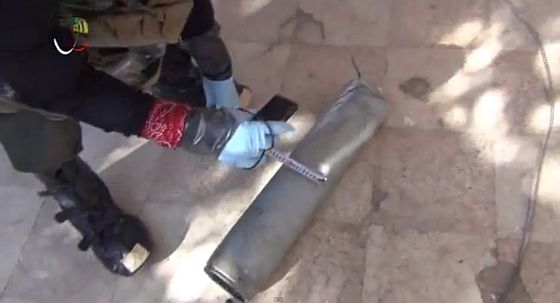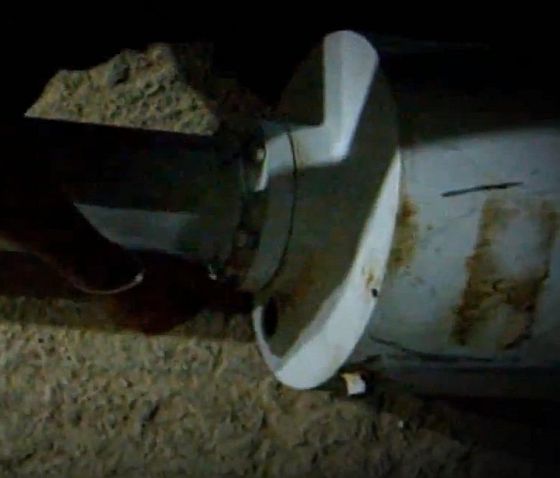President Obama says he hasn’t made a decision on whether to launch a military strike on Syria. Having consulted with his national security team and with foreign allies, the one person he might wish he could secretly consult would be the Syrian president himself. After all, since the White House has made it abundantly clear that the widely announced coming attack (assuming it happens) will be limited in scope, it’s effect will largely be determined by Bashar al-Assad. This might be what Bashar would tell Barack:
I’ve looked at your options, and I’m going to be honest here, I feel for you. Not exactly an embarrassment of riches you’ve got to choose from, strategy-wise. I mean, my God, there are just so many variables to consider, so many possible paths to choose, each fraught with incredible peril, and each leading back to the very real, very likely possibility that no matter what you do it’s going to backfire in a big, big way. It’s a good old-fashioned mess, is what this is! And now, you have to make some sort of decision that you can live with.
So, where do I begin? Well, this is just the tip of the iceberg, but let’s start with the fact that my alliance with Russia and China means that nothing you decide to do will have the official support of the UN Security Council. So, right off the bat, I’ve already eliminated the possibility of a legally sound united coalition like in Libya or the First Gulf War. Boom. Gone. Off the table.
Now, let’s say you’re okay with that, and you decide to go ahead with, oh, I don’t know, a bombing campaign. Now, personally, I can see how that might seem like an attractive option for you. No boots on the ground, it sends a clear message, you could cripple some of my government’s infrastructure, and it’s a quick, clean, easy way to punish me and make you look strong in the face of my unimaginable tyranny. But let’s get real here. Any bombing campaign capable of being truly devastating to my regime would also end up killing a ton of innocent civilians, as such things always do, which I imagine is the kind of outcome you people would feel very guilty about. You know, seeing as you are so up in arms to begin with about innocent Syrians dying. Plus, you’d stoke a lot of anti-American hatred and quite possibly create a whole new generation of Syrian-born jihadists ready to punish the United States for its reckless warmongering and yadda yadda yadda.
Okay, what else? Well, you could play small-ball and hope that limited airstrikes to a few of my key military installations will send me the message to refrain from using chemical weapons again, but, c’mon, check me out: I’m ruthless, I’m desperate, and I’m going to do everything I can to stay in power. I’d use chemical weapons again in a heartbeat. You know that. And I know you know that. Hell, I want to help you guys out here, but you gotta be realistic. Trust me, I am incapable of being taught a lesson at this point. Got it? I am too far gone. Way too far gone.
Oh, and I know some of you think a no-fly zone will do the trick, but we both know you can’t stomach the estimated $1 billion a month that would cost, so wave bye-bye to that one, too.
Moving on.
I suppose you could always, you know, not respond with military force at all. But how can you do that? I pumped sarin gas into the lungs of my own people, for God’s sake! You can’t just let me get away with that, can you? I mean, I guess you easily could, and spare yourself all of this headache, but then you would probably lose any of your remaining moral high ground on the world stage and make everything from the Geneva Conventions to America’s reputation as a beacon for freedom and democracy around the world look like a complete sham.
And, hey, as long as we’re just throwing stuff out there, let’s consider a ground invasion for a moment. Now, even if you could reasonably fund a ground invasion, which I’m pretty sure you can’t, what exactly would such an invasion accomplish in the long term? I suppose it’s possible that you could come in and sweep me out the door and that would be the end of it. It’s possible. You know, like, in the sense that seeing a majestic white Bengal tiger in the wild is possible. Or, more likely, you could find yourself entrenched in a full-blown civil war that drags on for 15 years and sets off further turmoil in the rest of the region, leading to even more dead bodies for your country and mine, and even more virulent hatred of America. In fact, boy, maybe this is the one option that should be totally off the table.
Oh, and speaking of me being toppled from power, let’s say, just for fun, that tomorrow I were to somehow be dethroned. Who’s in charge? Half of these rebel groups refuse to work with one another and it’s getting harder to tell which ones are actually just Islamic extremists looking to fill a potential power vacuum. We’ve got Christians, Sunnis, and Shias all poised to fight one another for control should I fall. You want to be the ones sorting through that mess when you’re trying to build a new government? I didn’t think so.
As Marsha Cohen notes, some of the most astute political commentary these days comes in the form of satire, and no, the words above did not actually come from Bashar al-Assad — they came from the Onion.
At the same time, there are quite a few professional political commentators whose work might benefit a bit if they injected a bit of irony into their observations.
A few days ago a blog post at The Nation on “The Moral Obscenities in Syria” solemnly featured the favorite question of all conspiracy theorists: Cui bono? Who benefits?
It’s a reasonable question. But by this point, when it comes to the chemical attacks in Damascus, it’s an easy question to answer: Assad, of course.
Whether Assad planned the attack, authorized it, or even knew about it before it captured the headlines, is by now besides the point.
Whether by accident or by design, this has turned out to be one of the most grizzly master-strokes in the whole conflict.
If 100,000 deaths exposed Western indifference to the plight of Syrians, 1,400 additional deaths are now exposing the impotence of the most powerful nation on earth and the weakness of the man who tries to play the role of the most powerful man on earth. And that’s the problem with both these expressions of American hubris: they only hold up when left untested.
American power might be more sustainable if it had more subtlety and didn’t allow itself to always ultimately be reduced to a display of pyrotechnics. Yes, Americans have great skill in setting off explosions — in the art of shock and awe — but when was the last time one of these performances actually accomplished something useful?
President Obama might feel like he’s rounding out his experience of presidential power if he gives the order for a fusillade of cruise missile strikes on Syria some time in the next few days, but to what end?
Years hence, when Obama feels safe enough to give an honest explanation for why he acted, will it be any better than Bill Clinton’s explanation for his relationship with Monica Lewinsky? “I did something for the worst possible reason — just because I could,” he said. “I think that’s just about the most morally indefensible reason anybody could have for doing anything.”
With a preponderance of the evidence always pointing strongly in the direction of the Assad regime being responsible for the chemical attack, the most pressing question has never been, who did it? but rather, what is an appropriate response?
In 2006, after a Hezbollah ambush resulted in eight Israeli soldiers getting killed and two captured, Israeli Prime Minister Ehud Olmert launched a war in which he said that Hezbollah’s stronghold in Southern Lebanon would be bombed “back into the stone age”. But after a month of devastating air strikes, Hezbollah, far from having been crushed, had demonstrated its capacity to withstand the assault. Once the fighting ended, Secretary-General Hassan Nasrallah was able to declare that Hezbollah had achieved a “divine victory” and his popularity soared across the Arab world among both Shia and Sunnis.
Likewise, an American attack on Assad’s military infrastructure — an attack which will be small in comparison to Israel’s assault on Lebanon — is pretty much guaranteed to leave the Syrian leader stronger. He will have faced and withstood American might and his willingness to use chemical weapons may not even have been diminished.
Even if his use of chemical weapons in the future turns out to be more cautious, the August 21 attack will still serve as a reminder of his force’s capabilities. Just as the Deir Yassin massacre in Palestine in 1948 demonstrated, a relatively small massacre can have a huge effect in terrorizing a population.
Assad has arguably already demonstrated the value of his chemical weapons arsenal even if he never uses it again. And Obama’s message to Assad — his “punishment” for using prohibited weapons — is likely to telegraph to the Syrian people the opposite message: that there is no limit on the number of people the regime slaughters so long as their deaths are bloody — the kinds of deaths the world deems tolerable.





